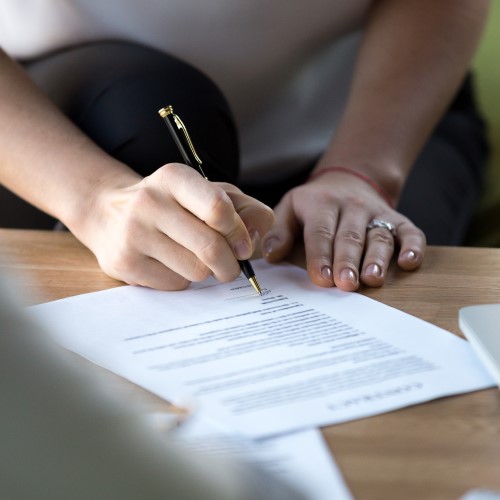What is probate and how does it work?
The probate process is important to make sure a person's estate is distributed fairly after they die.
Usually, the probate application is done by someone who is named in the person’s Will as the “executor of the estate”, but if they don’t have a Will then you might need to apply for permission to become the administrator of the estate.
How does the probate process work?
When someone dies, there’s a lot of admin to get through before their assets can be given out. The process involves:
- identifying who the executor of the estate is,
- finding out what the person who died owned and any debt they had,
- applying for permission to give out the inheritance (known as grant of representation),
- paying inheritance tax and any debts the person had,
- and, finally, distributing their assets.
Identifying who the “executor of the estate” is
The first step in probate is usually to work out who has the right to be the executor of the estate. If there’s a Will then this should be fairly simple, but if there’s not then someone close to them - usually a family member or spouse - can apply to the court to be given the right to administer their estate.
Once the executor knows who they are, they’re likely to be very busy.
Working out what is included in the estate
The executor will need to find out what the person who died owned, including any investments and property, and if they have any debt.
They might need to go through their paperwork such as bank statements and insurance policies to get an accurate number.
This is really important because the executor will need to report on the value of the estate when they apply for grant of representation (see below) and fill out inheritance tax forms.
Applying for grant of representation
The executor will then need to apply for a “grant of representation”, which in most cases they’ll legally need before they can do anything.
You can apply for this yourself but it can be complicated and there are probate solicitors who can take this work on for you.
If the person who died had less than £5,000, some banks and financial institutions will hand over the money without needing a grant of representation. They will definitely need to see a death certificate though.
A grant will likely be needed if the person who dies leaves one or more of the following:
- Assets worth more than £5,000 in total (this figure can vary),
- Property or land in their name or held as ‘tenants in common’ with someone else,
- Stocks or shares,
- Some insurance policies.
There are two types of grants of representation; a Grant of Probate (where there is a Will) and Letters of Administration (where there is no Will). Either document gives the legal right to access and give out a person’s money and anything they own after they die, known as their “estate”.
How to apply for grant of probate or grant of letters of administration
If you decide to apply for grant of representation yourself, they will need to fill out a few forms. They’ll also need to swear an oath to say they will follow the deceased person’s wishes, even if a solicitor is applying on their behalf. The main steps they’ll need to follow are:
- Complete a probate application form – you’ll need to complete the PA1P if there is a Will, or a PA1A if there isn’t a Will.
- Complete the relevant inheritance tax form. You’ll need to complete this form even if you don’t think you’ll need to pay inheritance tax.
- Send your application – you’ll need to send the probate and inheritance tax forms to your local probate office along with the Will (if there is one), the application fee and the death certificate.
- Swear an oath – you’ll need to make a promise that the information you’ve given is true to the best of your knowledge. The probate office will send you an oath and details on how to arrange an appointment to make the oath in front of a solicitor.
There are more details on the process and types of forms to fill out on the UK government website.
It’s then a case of waiting for the grant of representation to come through in the post. Once this has arrived, you’ll have to send a copy to the relevant organisations in order to get hold of the person’s assets.
Paying inheritance tax and any debts
If the estate does owe inheritance tax, you’ll need to pay some or all of the inheritance tax in order to receive the grant of representation.
Next you’ll need to clear any debts – this might include outstanding bills or tax.
Distributing the deceased persons’ assets
If there’s a Will, it should then be fairly straightforward to work out who to give what to. If there’s not, they may need to use common sense. The executor is legally bound to follow the wishes of the person who died.
If any parts of the estate are held in joint names (such as property or a bank account) this will automatically pass to the surviving spouse/civil partner.
How long does probate take?
Depending on how complicated the person’s estate is, it’s likely to take roughly four to 12 weeks to get to the point of applying for probate. It usually then takes about eight weeks from when you apply for probate to be granted.
It’s worth being aware though that the process can take longer.
Do you need probate if there’s a Will?
It depends on the size of the estate and the value of individual assets. If the estate is small, with no property and less than £5,000 in the bank, probate isn't likely to be needed.
This is because some assets and small amounts of money can be dealt with without probate.
If the person who died owned joint assets, such as a joint bank account or a property as joint tenants, this will pass to the surviving co-owner under the right of survivorship.
The co-owner will need to produce the death certificate to formally transfer the asset into their sole name, but usually won’t need probate to do this.
Over 50s Life Cover
With our Over 50s Life Cover, policyholders can nominate beneficiaries, which means the policy pays out up to £5,000 to an appointed person without the need for probate. This can go towards funeral expenses without you needing to wait for probate to be sorted out.

Look after your loved ones with our affordable life cover
OneFamily Over 50s Life Cover is designed to give you and your loved ones peace of mind at a very difficult time, by helping pay towards the cost of your funeral.
DO NOT DELETE

Related links
You may also be interested in:
How to plan for your funeral
While it may feel morbid to plan your own funeral, it’s an act of kindness for the people left behind.
What happens to debt when you die?
If you don’t plan for it, your loved ones could be lumped with your debts after you die.
How to leave money for your funeral
Have you thought about leaving money for your funeral? If you don’t make provisions, your family could be left to foot the bill.
What is Funeral Funding?
Funeral Funding is automatically built into our Over 50s Policy and is designed to contribute towards the cost of your funeral.
